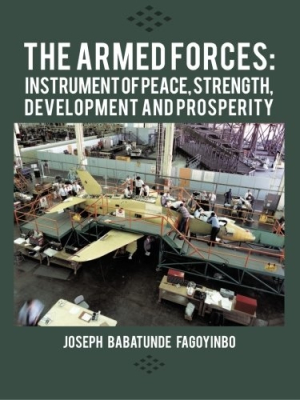The Armed Forces
Instrument of Peace, Strength, Development and Prosperity
With the succinct and to-the-point voice of an engineer, this is an informative analysis of the societal role the military plays in various areas of the world.
A nation’s military has more uses than just going to war. Joseph Babatunde Fagoyinbo explains other roles they play in societies in his massive exploration of the world’s armed forces and the industrial complexes that support them, The Armed Forces: Instrument of Peace, Strength, Development, and Prosperity. This thorough survey of national military forces is a solid and thoughtful overview of the military, economic, and political situation in each major region of the world. As such, it is a primer for anyone with an interest in how the modern military-industrial complex works.
As a former senior instructor at the Nigerian Defense Academy and the son of a general, Fagoyinbo is familiar with the positive contribution the military can make to a nation’s pride, stability, and economic development. While he cautions that the military should not “venture into governance,” he believes nations need to engage the armed forces’ “military and civilian personnel in productive ventures,” particularly ones that “promote socio-economic development.” Nations invest a “tremendous amount of resources” in their military, as he demonstrates in page after page of charts and tables. Most of those nations, Fagoyinbo claims, are not getting the return they should from their “MICs” (military industrial complexes).
Much of this thick volume is background material on the history of nations, their armed forces, and their MICs. In addition to a lengthy section on the world’s largest MIC—that of the United States—The Armed Forces examines in depth those of many others, including Australia, Brazil, Kuwait, and Pakistan. The bigger and more powerful the nation, the more in-depth the examination. China, for example, gets a thirty-page chapter with as many headings and subheadings as pages. These include brief looks at “China’s Advancing Defense Industries” and its “Cyber-Warfare” arm, as well as short but succinct examinations of the agricultural and industrial sectors which support the People’s Liberation Army.
Fagoyinbo writes like the engineer he is; each section is brief, sharp, and to the point, with a minimum of flourish. He likes to make his point with numbers, and the book is replete with charts and tables and lengthy lists of references. All of these facts and figures are in historical and current context, including examining when and where the armed forces of some nations have been or may be called upon to perform a martial, peacekeeping, or other form of duty, such as building dams and roads or keeping order in contentious areas.
Fagoyinbo is both professor and analyst, and his book has a point. The chapter on his native Nigeria, for example, includes analysis of the “constraints” (such as the “haphazard industrial planning,” “weak research and technology base,” and “inadequate programme for harnessing available human resources”) under which the Nigerian military struggles in its efforts to contribute to the nation’s economic, industrial, and technological growth. The book examines how other nations, notably Brazil, have overcome similar constraints, and presents these as possible pathways for Nigeria, and others, to make similar progress.
The Armed Forces is not meant for the general public, although some readers, teachers, schools, libraries, and other organizations should find it to be of value as a reference book on global military forces and the MICs that support them. The research is solid, and the writing, although at times a bit dry, flows well and conveys a great deal of information in an expert and succinct manner.
Reviewed by
Mark McLaughlin
Disclosure: This article is not an endorsement, but a review. The publisher of this book provided free copies of the book and paid a small fee to have their book reviewed by a professional reviewer. Foreword Reviews and Clarion Reviews make no guarantee that the publisher will receive a positive review. Foreword Magazine, Inc. is disclosing this in accordance with the Federal Trade Commission’s 16 CFR, Part 255.

